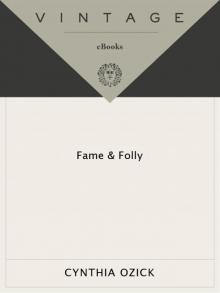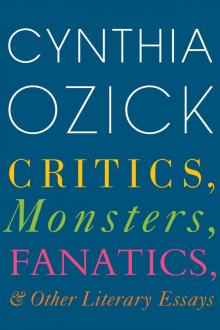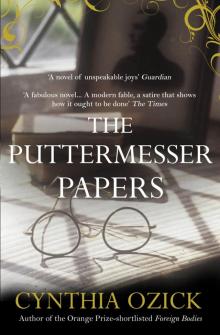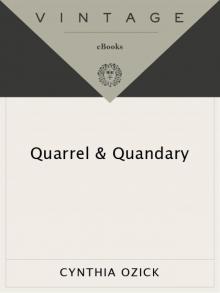- Home
- Cynthia Ozick
Fame & Folly Page 4
Fame & Folly Read online
Page 4
anything else is a waste of time and energy. No one in London cares a hang what is written in America. After getting an American audience a man has to begin all over again here if he plans for an international hearing … The situation has been very well summed up in the sentence: “Henry James stayed in Paris and read Turgenev and Flaubert, Mr. Howells returned to America and read Henry James.” … At any rate if T.S.E. is set on a literary career, this is the place to begin it and any other start would be very bad economy.
“I might add,” he concluded, “that a literary man’s income depends very much on how rigidly he insists on doing exactly what he himself wants to do. It depends on his connection, which he makes himself. It depends on the number of feuds that he takes on for the sake of his aesthetic beliefs. T.S.E. does not seem to be so pugnacious as I am and his course should be smoother and swifter.”
The prediction held. The two-year eruption that was Vorticism waned, and so did Pound’s local star; he moved on to Paris—leaving London, as it would turn out, in Eliot’s possession. Pound’s letter to the elder Eliot was not all bluster: he may have been a deft self-promoter, but he was also a promoter of literary ideas, and in Eliot’s work he saw those ideas made flesh. The exuberance that sent Pound bustling through London to place Eliot here and there was the enthusiasm of an inventor whose thingamajig is just beginning to work in the world at large, in the break-through spirit of Alexander Graham Bell’s “Mr. Watson, come here.” In Pound’s mind Eliot was Pound’s invention. Certainly the excisions he demanded in The Waste Land radically “modernized” it in the direction of the objective correlative by keeping in the symbols and chopping out context and narrative, maneuvering the poem toward greater obliqueness and opacity. He also maneuvered Eliot. A determined literary man must go after his own “connection,” he had advised Eliot’s father, but the boisterous Pound served the reticent Eliot in a network of useful connections that Eliot would not have been likely to make on his own—including John Quinn, a New York literary philanthropist who became his (unpaid) agent in America and shored him up from time to time with generous money contributions.
Eliot was dependent on Pound’s approval, or for a long while behaved as if he was. It was Pound who dominated the friendship, periodically shooting out instructions, information, scalawag counsel and pontification. “I value his verse far higher than that of any other living poet,” Eliot told John Quinn in 1918. Gradually, over a span of years, there was a reversal of authority and power. Eliot rose and Pound sank. Under the pressure of his marriage (Vivien never held a job of any kind, nor could she have, even if it had been expected of her), Eliot ascended in the pragmatic world as well. He gave up teaching secondary school—it required him to supervise sports—and tried evening adult extension-course lecturing. The preparation was all-consuming and the remuneration paltry. Finally he recognized—he was, after all, his father’s son—that this was no way to earn a living. A friend of Vivien’s family recommended him to Lloyds Bank, where he turned out to be very good at the work—he had a position in the foreign department—and was regularly praised and advanced. Eventually he joined Faber & Gwyer, the London publishing house (later Faber & Faber), and remained associated with it until the end of his life. And then it was Pound who came to Eliot with his manuscripts. Eliot published them, but his responses, which had once treated Pound’s antics with answering foolery, became heavily businesslike and impatient. As founder and editor of a literary journal Vivien had named The Criterion, Eliot went on commissioning pieces from Pound, though he frequently attempted to impose coherence and discipline; occasionally he would reject something outright. In 1922 Pound had asserted that “Eliot’s Waste Land is I think the justification of the ‘movement,’ of our modern experiment, since 1900,” but by 1930 he was taunting Eliot for having “arrived at the supreme Eminence among English critics largely through disguising himself as a corpse.” Admiration had cooled on both sides. Still, Eliot’s loyalty remained fundamentally steadfast, even when he understood that Pound may have been approaching lunacy. After the Second World War, when Pound was a patient in St. Elizabeth’s Federal Hospital for the Insane in Washington, D.C.—the United States government’s alternative to jailing him for treason—Eliot signed petitions for his release and made sure to see him on visits to America. Eliot never publicly commented on the reason for Pound’s incarceration: Pound had supported the Axis and had actively aided the enemy. On Italian radio, in Mussolini’s employ, he had broadcast twice-weekly attacks on Roosevelt, Churchill, and the Jews (whom he vilified in the style of Goebbels).
Though in the long run the friendship altered and attenuated—especially as Eliot grew more implicated in his Christian commitment and Pound in his self-proclaimed paganism—Eliot learned much from Pound. He had already learned from Laforgue the technique of the ironically illuminated persona. The tone of youthful ennui, and the ageless though precocious recoil from the world of phenomena, were Eliot’s own. To these qualities of negation Pound added others: indirection, fragmentation, suggestibility, the force of piebald and zigzag juxtaposition—what we have long recognized as the signs of modernism, that famous alchemy of less becoming more. But even as he was tearing down the conventional frame of art, Pound was instructing Eliot in how to frame a career: not that Eliot really needed Pound in either sphere. Poets and critics may fabricate “movements,” but no one can invent the Zeitgeist, and it was the Zeitgeist that was promulgating modernism. Eliot may well have been headed there with or without Pound at the helm. That Pound considered Eliot a creature of his own manufacture—that he did in fact tinker with the design—hardly signifies, given that Eliot’s art was anyhow likely to fall into the rumbling imperatives of its own time. As for Eliot’s advancement into greater and greater reputation, even pushy Pound could not push a miracle into being. Still, it was evident early on that Pound’s dictates were in full operation. “Now I am going to ask you to do something for me,” Eliot informs his brother Henry in 1915,
in case you are in Boston or New York this summer. These are suggestions of Ezra Pound’s, who has a very shrewd head, and has taken a very great interest in my prospects. There will be people to be seen in Boston and New York, editors with whom I might have some chance … As you are likeliest to be in Boston, the first thing is the Atlantic Monthly. Now Pound considers it important, whenever possible, to secure introductions to editors from people of better social position than themselves,
and he goes on to propose that Isabella Stewart Gardner, an influential blueblood connection of his, be dragooned into sending a note to the editor of the Atlantic on Eliot’s behalf. A few days later he is writing to Mrs. Gardner herself, announcing the imminent arrival of his brother, “in order that he may get your advice.” To Henry he admits he has only a handful of poems to show, including “some rather second rate things,” but anyhow he asks him to try for an opening at Harper’s, Century, Bookman, and the New Republic. “Nothing needs to be done in Chicago, I believe.”
Thus, Pound’s training in chutzpah. Yet much of it was native to Eliot, picked up at the parental knee. Not for nothing was he the offspring of a mother who was a model of the epistolary maneuver, or of a father who demanded instant success. He had been reared, in any event, as one of the lords of creation in a conscious American aristocracy that believed in its superior birthright—a Midwestern enclave of what Cousin Charles Eliot had called “the finest New England spirit.” In the alien precincts of London, where his credentials were unknown or immaterial, the top could not be so easily guaranteed; it would have to be cajoled, manipulated, seduced, dared, commanded, now and then dodged; it would have to be pressed hard, and cunningly. All this Eliot saw for himself, and rapidly. Reserve shored up cunning. It scarcely required Pound to teach him how to calculate the main chance, or how to scheme to impose his importance. He was actually better at it than Pound, because infinitely silkier. Whereas Pound had one voice to assault the barricades with—a cantankerous blast in nutty frontier
sman spelling (“You jess set and hev a quiet draw at youh cawn-kob”) that was likely to annoy, and was intended to shake you up—Eliot had dozens of voices. His early letters—where he is sedulously on the make—are a ventriloquist’s handbook. To Mrs. Gardner he purrs as one should to a prominent patroness of the arts, with friendly dignity, in a courteously appreciative tone, avoiding the appearance of pursuit. Addressing the irascibly playful Pound, he is irascibly playful, and falls into identical orthographical jokiness. To his benefactor John Quinn he is punctiliously—though never humbly—grateful, recording the state of his literary barometer with a precision owed to the chairman of the board; nor does he ever fail to ask after Quinn’s health. To his father he writes about money, to his mother about underwear and overcoats. Before both of them, anxiety and dutifulness prevail; he is eager to justify himself and to tot up his triumphs. He means to show them how right he was in choosing a London life; he is not a disappointment after all. “I am staying in the bank,” he reports (he had been offered an editorship on a literary journal)—this alone will please his father, but there is much more:
As it is, I occupy rather a privileged position. I am out of the intrigues and personal hatreds of journalism, and everyone respects me for working in a bank. My social position is quite as good as it would be as editor of a paper. I only write what I want to—now—and everyone knows that anything I do write is good. I can influence London opinion and English literature in a better way. I am known to be disinterested. Even through the Egoist I am getting to be looked up to by people who are far better known to the general public than I. There is a small and select public which regards me as the best living critic, as well as the best living poet, in England. I shall of course write for the Ath. [The Athenaeum] and keep my finger in it. I am much in sympathy with the editor, who is one of my most cordial admirers. With that and the Egoist and a young quarterly review which I am interested in, and which is glad to take anything I will give, I can have more than enough power to satisfy me. I really think that I have far more influence on English letters than any other American has ever had, unless it be Henry James. I know a great many people, but there are many more who would like to know me, and I can remain isolated and detached.
All this sounds very conceited, but I am sure it is true, and as there is no outsider from whom you would hear it, and America really knows very little of what goes on in London, I must say it myself. Because it will give you pleasure if you believe it, and it will help to explain my point of view.
This was surely the voice of a small boy making his case to his skeptical parents: it will give you pleasure if you believe it. He was thirty years old. The self-assurance—or call it, as others did, the arrogance—was genuine, and before his father and mother he was unashamed of speaking of the necessity of power. Such an aspiration was axiomatic among Eliots. What he had set himself to attain was the absolute pinnacle—a place inhabited by no one else, where he could “remain isolated and detached.” Fate would give him his wish exactly and with a vengeance, though not quite yet. If he was puffing London to St. Louis, and representing himself there as “the best living critic, as well as the best living poet, in England,” two months later he was telling Lytton Strachey that he regarded “London with disdain,” and divided “mankind into supermen, termites, and wireworms. I am sojourning among the termites.”
In all this there is a wonder and an enigma: the prodigy of Eliot’s rocketlike climb from termite to superman. London (and New York and Boston) was swarming with young men on a course no different from Eliot’s. He was not the only one with a hotly ambitious pen and an appetite for cultivating highly-placed people who might be useful to him. John Middleton Murry and Wyndham Lewis, for example, both of whom were in Eliot’s immediate circle, were equally striving and polished, and though we still know their names, we know them more in the nature of footnotes than as the main text. All three were engaged in the same sort of essayistic empire-building in the little magazines, and at the same time. Lewis published Eliot in BLAST, Murry published him in the Athenaeum, and later Eliot, when he was editing the Criterion, published Lewis. Yet Eliot very quickly overshadowed the others. The disparity, it can be argued, was that Eliot was primarily a poet; or that Eliot’s talent was more robust. But even if we believe, as most of us do, that genius of its own force will sooner or later leap commandingly out (Melville’s and Dickinson’s redemption from obscurity being our sacred paradigms), the riddle stands: why, for Eliot, so soon? His termite days were a brevity, a breath; he was superman in an instant. What was it that singled Eliot out to put him in the lead so astoundingly early? That he ferociously willed it means nothing. Nearly all beginning writers have a will for extreme fame; will, no matter how resilient, is usually no more efficacious in the marketplace than daydream.
If there is any answer to such questions—and there may not be—it may lie hidden in one of Eliot’s most well-appointed impersonations: the voice he employed as essayist. That charm of intimacy and the easy giving of secrets that we like to associate with essayists—Montaigne, Lamb, Hazlitt, George Orwell, Virginia Woolf when the mood struck her—was not Eliot’s. As in what is called the “familiar” essay, Eliot frequently said “I”—but it was an “I” set in ice cut from the celestial vault: uninsistent yet incontestable, serenely sovereign. It seemed to take its power from erudition, and in part it did; but really it took it from some proud inner figuration or incarnation—as if Literature itself had been summoned to speak in its own voice:
I am not considering whether the language of Dante or Shakespeare is superior, for I cannot admit the question: I readily affirm that the differences are such as make Dante easier for a foreigner. Dante’s advantages are not due to greater genius, but to the fact that he wrote when Europe was still more or less one. And even had Chaucer or Villon been exact contemporaries of Dante, they would still have been farther, linguistically as well as geographically, from the center of Europe than Dante.
Who could talk back to that? Such sentences appear to derive from a source of knowledge—a congeries of assumptions—indistinguishable from majesty. In short, Eliot would not permit himself to be ignored, because it was not “himself” he was representing, but the very flower of European civilization. And there may have been another element contributing to the ready acceptance of his authority: as a foreigner, he was drawn to synthesizing and summarizing in a way that insiders, who take their context for granted, never do. He saw principles where the natives saw only phenomena. Besides, he had a clear model for focused ascent: Henry James. Knowing what he meant to become, he was immune to distraction or wrong turnings. “It is the final perfection, the consummation of an American,” Eliot (in one of his most autobiographical dicta) wrote of James, “to become, not an Englishman, but a European—something which no born European, no person of any European nationality, can become.”
So much for the larger trajectory. He had mapped out an unimpeded ideal destination. In the lesser geography of private life, however, there was an unforeseen impediment. Henry James had never married; Eliot had married Vivien. In 1915 she was twenty-seven, slender, lively, very pretty, with a wave in her hair and a pleasant mouth and chin. By 1919, Virginia Woolf was describing her as “a washed out, elderly and worn looking little woman.” She complained of illness from the very first, but otherwise there were few immediate hints of the devastation to come. She was absorbed in Eliot’s career. He brought his newest work to her for criticism; she read proofs; she assisted in preparing the Criterion. She also did some writing of her own—short stories, and prose sketches that Eliot admired and published in the Criterion. She had energy enough at the start: there were excursions, dinners, visits to Garsington, dance halls, dance lessons, theater, opera; even a flirtation with Bertrand Russell that turned into a one-night stand. (“Hellish and loathsome,” Russell called it.) A month after the wedding she told Russell that she had married Eliot because she thought she could “stimulate” him, but that it could not
be done. She began to suffer from headaches, colitis, neuralgia, insomnia. “She is a person who lives on a knife edge,” Russell said. Eliot himself often woke at night feeling sick. He was plagued by colds, flu, bronchial problems; he smoked too much and he consistently drank too much, though he held it well. Retreating from Vivien, he threw himself into the work at the bank and into developing his literary reputation. Vivien had nowhere to go but into resentment, ill-will, hysteria. In the mornings the bed linens were frequently bloody—she menstruated excessively, and became obsessed with washing the sheets. She washed them herself even when they stayed in hotels. Morphine was prescribed for her various symptoms; also bromides and ether (she swabbed her whole body with ether, so that she reeked of it), and mercilessly bizarre diets—a German doctor combined starvation with the injection of animal glands. She collapsed into one nervous illness after another. Eliot repeatedly sent her to the country to recuperate while he remained in town. When his mother, now an elderly widow, and one of his sisters came on a visit from America, Vivien was absent, and Eliot was obliged to manage the complications of hospitality on his own. Anxiety over Vivien crept into all his business and social correspondence: “my wife has been very ill”; “she is all right when she is lying down, but immediately she gets up is very faint”; “wretched today—another bad night”; “Have you ever been in such incessant and extreme pain that you felt your sanity going, and that you no longer knew reality from delusion? That’s the way she is. The doctors have never seen so bad a case, and hold out no definite hope, and have so far done her no good. Meanwhile she is in screaming agony …”

 Antiquities
Antiquities Fame & Folly
Fame & Folly The Messiah of Stockholm
The Messiah of Stockholm Critics, Monsters, Fanatics, and Other Literary Essays
Critics, Monsters, Fanatics, and Other Literary Essays Heir to the Glimmering World
Heir to the Glimmering World The Din in the Head
The Din in the Head Dictation
Dictation The Puttermesser Papers
The Puttermesser Papers Metaphor and Memory
Metaphor and Memory Art and Ardor
Art and Ardor Foreign Bodies
Foreign Bodies Quarrel & Quandary
Quarrel & Quandary